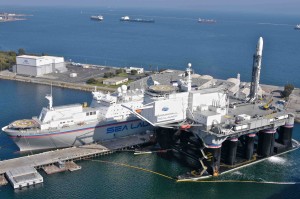
Sea Launch Commander (background) and Odyssey launch platform (foreground). Image courtesy Sea Launch
NYON, Switzerland, August 22, 2014 – Sea Launch announced today a series of cost-reduction measures designed to address an upcoming gap in the launch manifest of the Zenit-3SL system. According to plan, it is expected that Sea Launch will resume and start stepping-up its launch activity during mid-2015/mid-2016 time frame.
Before Hawthorne’s SpaceX grabbed the public’s imagination, the Sea Launch system took an audacious approach to launching satellites and made it happen in a few short years. The original consortium converted an offshore oil platform into a highly automated rocket launcher staffed and monitored from a mothership. Both travel to the equator and together lob communication satellites into geostationary transfer orbit. The earth spins fastest at zero latitude giving a free extra kick to the spacecraft. Since ‘geo’ is directly above the equator, it takes less rocket fuel to get the spacecraft where it needs to be. Once there, it can keep much more of its precious onboard fuel and last longer before replacement. Sea Launch has been in operation for many years with a large number of successes and a couple of failures. Its homeport is Long Beach. Drive into the port complex and go past Port V and you can see the mothership. The platform is most easily seen from the Gerald Desmond Bridge.
Following a launch failure a couple of years ago, the holding company went into bankruptcy, reorganized, and came back as a mostly Russian entity based in Switzerland. Space is a notoriously cold business and Sea Launch currently has no customers on its manifest. While it looks for some, it has decided to scale back, lay up the marine hardware, and reduce its staff. The press release says this is common in the sea business and that future customers are expected to turn up. Let’s hope so. Seeing launch hardware that exports products to space is a nice counterpoint to all the ships bringing products into the U.S. from other lands.